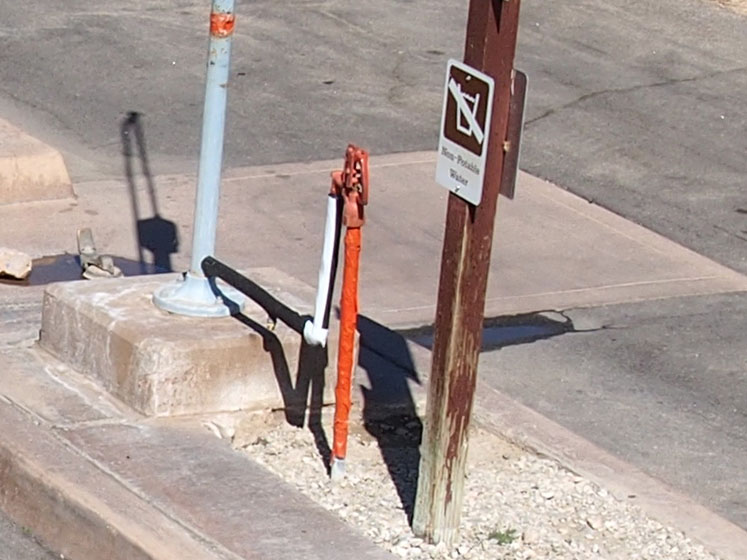What happens if you see a dump station with a water faucet, but there is no sign telling you if its potable or not? How do you know if an RV dump station water is potable? There are a few tips you can use…

How Do I Know if RV Dump Station Water is Potable?
The large majority of RV dump stations offer water plumbed from city tap. It’s very rare that a dump station will pump water from a well or pressurize reclaimed gray water.
Thus, if it comes from city tap, then the water is the same clean drinking water that flows into residences. It’s definitely potable. So, how do you know if that water faucet is plumbed from city tap?
Dump Stations Located Near Towns
If a dump station is located near a town, or inside a town, then it’s water is city tap.
This means the water is potable. Even if there is a sign that says “non-potable”, or “not safe for drinking”, it still is city tap water. The owner of the dump station will warn you not to drink this water because the faucet is located too close to the sewage drain, and there could be tiny droplets of sewage on the threaded end of the faucet.
Dump Stations Located in the Middle of Nowhere
If you’re at a campground or gas station located several miles from any other building or town, then it’s likely the water faucet is fed from a well. This water could still be potable, yet the owner of the dump station does not want to make any guarantees for liability reasons.
Dump stations located in campgrounds often pump water from a well and then run it through some kind of filtration. Some national parks have their own water towers. Generally, these are going to be safe to drink, and most parks will label their faucets as potable and not-potable.
An RV Dump Station with Two Faucets
If an RV dump station has two water faucets, the one furthest away from the sewage drain is usually intended for tank refill.
Color Coded Faucet Handles
Often times, water faucet handles are painted…
- Red means that it’s non-potable
- Blue or green means that it’s potable.
But we’ve filled our tanks from red-painted handles many times before and have never gotten sick from the water. So, it’s still not a true test of color-coding.
RV Dump Station with Only One Faucet
Most RV dump stations have only one water faucet, and most of the time the handle is painted red.
An overwhelming majority of these faucets are plumbed from city tap water, meaning that it’s safe for drinking. Even if there is a sign warning you not to drink this water, it actually is cleaning drinking water…
- Dump station owners warn you not to drink this water primarily because the faucet is located too close to the sewage drain. Tiny droplets of sewage can become airborne and land on the threaded end of the faucet. You can rub some hand sanitizer on the thread as a preventive measure.
- Many gas station operators don’t want people hogging up too much water. Particularly in California, where there is an on-going water rationing, this is the case.
Should You Ask the Manager?
We don’t recommend asking the manager if their dump station water is safe to drink. The reason why is because they will never give a straight answer. That is, no manager will make themselves liable for your potential illness. Even if their dump station faucet is plumbed from city tap, they are not going to take a chance that you might have also eaten some bad chinese food, and blame it on them.
What If an RV Dump Station Has a Sign Warning Me that the Water is Unsafe?
Then, don’t fill your tank with it. Ultimately, it’s your responsibility to fill your tank with it or not.
How Else Can I Determine if the Water is Safe for Drinking?
- Smell it. Unsafe water should have an odor to it.
- Unsafe water is often cloudy in appearance.
- Fill a glass jar with it and hold it up to the sun. Does it look green, yellow, or cloudy?
- Read online reviews. Campendium and FreeRoam are two great places that list RV dump stations and offer crowd-sourced reviews. FreeRoam will let you filter listings by, “Fresh Water”.
What About Water Purifying Tablets?
Many RVers, not just boondockers, use water purifying tablets. However, RV water tanks don’t really have a way to put tablets into them. Most RVers fill their tanks with what they believe is potable water, and then drop a tablet into a gallon jug, and fill the jug from their kitchen faucet.
For more information about this topic, see our full length article, “Using Water Purifying Tablets for RV Use“.
What About Buying Bottled Water Instead?
Actually, many boondockers do this too. But, they buy gallon jugs of distilled water at grocery stores or Wal-Mart.
They’ll still fill their water tanks with what they believe is potable water, but only use it for washing dishes, showering, flushing toilets, or other kinds of washing. It actually helps them make their water tanks last longer.


NEVER fill your water tanks anywhere near a dump station! Potable water or not, the hose is likely to be contaminated.